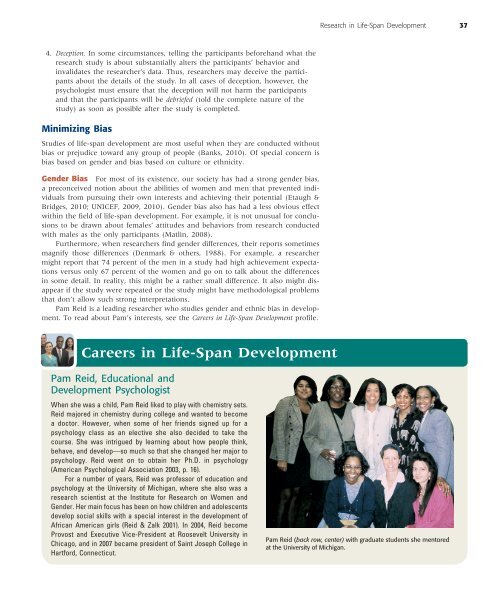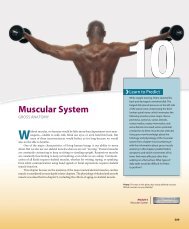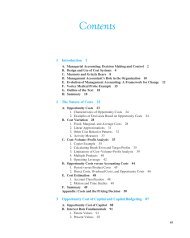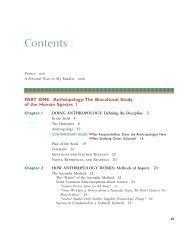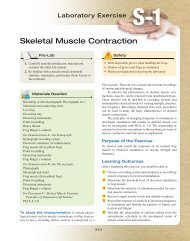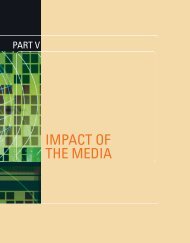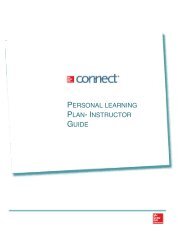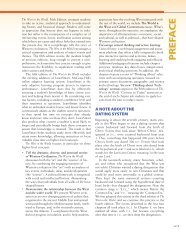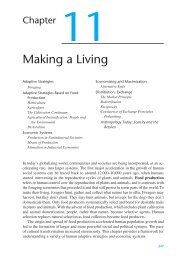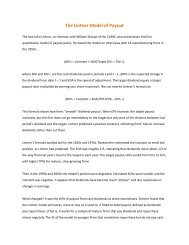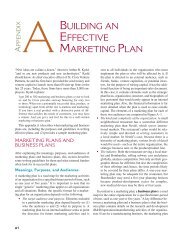Research in Life-Span Development
Research in Life-Span Development
Research in Life-Span Development
Create successful ePaper yourself
Turn your PDF publications into a flip-book with our unique Google optimized e-Paper software.
4. Deception. In some circumstances, tell<strong>in</strong>g the participants beforehand what the<br />
research study is about substantially alters the participants’ behavior and<br />
<strong>in</strong>validates the researcher’s data. Thus, researchers may deceive the participants<br />
about the details of the study. In all cases of deception, however, the<br />
psychologist must ensure that the deception will not harm the participants<br />
and that the participants will be debriefed (told the complete nature of the<br />
study) as soon as possible after the study is completed.<br />
M<strong>in</strong>imiz<strong>in</strong>g Bias<br />
Studies of life-span development are most useful when they are conducted without<br />
bias or prejudice toward any group of people (Banks, 2010). Of special concern is<br />
bias based on gender and bias based on culture or ethnicity.<br />
Gender Bias For most of its existence, our society has had a strong gender bias,<br />
a preconceived notion about the abilities of women and men that prevented <strong>in</strong>dividuals<br />
from pursu<strong>in</strong>g their own <strong>in</strong>terests and achiev<strong>in</strong>g their potential (Etaugh &<br />
Bridges, 2010; UNICEF, 2009, 2010). Gender bias also has had a less obvious effect<br />
with<strong>in</strong> the fi eld of life-span development. For example, it is not unusual for conclusions<br />
to be drawn about females’ attitudes and behaviors from research conducted<br />
with males as the only participants (Matl<strong>in</strong>, 2008).<br />
Furthermore, when researchers fi nd gender differences, their reports sometimes<br />
magnify those differences (Denmark & others, 1988). For example, a researcher<br />
might report that 74 percent of the men <strong>in</strong> a study had high achievement expectations<br />
versus only 67 percent of the women and go on to talk about the differences<br />
<strong>in</strong> some detail. In reality, this might be a rather small difference. It also might disappear<br />
if the study were repeated or the study might have methodological problems<br />
that don’t allow such strong <strong>in</strong>terpretations.<br />
Pam Reid is a lead<strong>in</strong>g researcher who studies gender and ethnic bias <strong>in</strong> development.<br />
To read about Pam’s <strong>in</strong>terests, see the Careers <strong>in</strong> <strong>Life</strong>-<strong>Span</strong> <strong>Development</strong> profi le.<br />
Careers <strong>in</strong> <strong>Life</strong>-<strong>Span</strong> <strong>Development</strong><br />
Pam Reid, Educational and<br />
<strong>Development</strong> Psychologist<br />
When she was a child, Pam Reid liked to play with chemistry sets.<br />
Reid majored <strong>in</strong> chemistry dur<strong>in</strong>g college and wanted to become<br />
a doctor. However, when some of her friends signed up for a<br />
psychology class as an elective she also decided to take the<br />
course. She was <strong>in</strong>trigued by learn<strong>in</strong>g about how people th<strong>in</strong>k,<br />
behave, and develop—so much so that she changed her major to<br />
psychology. Reid went on to obta<strong>in</strong> her Ph.D. <strong>in</strong> psychology<br />
(American Psychological Association 2003, p. 16).<br />
For a number of years, Reid was professor of education and<br />
psychology at the University of Michigan, where she also was a<br />
research scientist at the Institute for <strong>Research</strong> on Women and<br />
Gender. Her ma<strong>in</strong> focus has been on how children and adolescents<br />
develop social skills with a special <strong>in</strong>terest <strong>in</strong> the development of<br />
African American girls (Reid & Zalk 2001). In 2004, Reid become<br />
Provost and Executive Vice-President at Roosevelt University <strong>in</strong><br />
Chicago, and <strong>in</strong> 2007 became president of Sa<strong>in</strong>t Joseph College <strong>in</strong><br />
Hartford, Connecticut.<br />
<strong>Research</strong> <strong>in</strong> <strong>Life</strong>-<strong>Span</strong> <strong>Development</strong> 37<br />
Pam Reid (back row, center) with graduate students she mentored<br />
at the University of Michigan.


